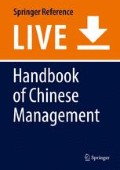Abstract
With the start of a new round of community reform in China, the issue of administration and de-administration of the residents’ committee has once again become a hot topic. Based on the observation of the practical cases in different parts of China, this paper summarizes three institutional models of community de-administration reform and reveals each model’s policy connotation, development course, main features, and operational effects. There are three main modes: first, “separation of residents’ committee and community workstation model,” focusing on organizational function segmentation; second, “cancel the street office and strengthen the community model,” focusing on power structure reorganization; and third, “administrative access system of community work model,” focusing on the establishment of community power list. The key to the reform of community de-administration is to excavate, cultivate, and release the social factors and mechanisms that the resident’s committee has long been restrained by the administration and to rebuild and reconstruct the balance between the “administrative” and “social” dual attributes of the residents’ committee.
References
Chen Y, Li N (2016) Shequ gongtongti kunjing yu shequ jingshen chongsu (Community dilemma and remodel of community spirit). Jilin daxue shehui kexue xuebao (Jilin Univ J Soc Sci Ed) 4:54–63
He Y, He C (2005) Zhongguo chengshi jiceng zizhi zuzhi de neijuanhua jiqi chengyin (An analysis of involution of Chinese resident’s committee and its reason). Zhongshan daxue xuebao (shehui kexueban) (J Sun Yatsen Uni) (Soc Sci Ed) 5:104–109
Liu T, Liu K (2017) Juweihui quxing zhenghua: cuowu lilun wudao xiadi qishi zhan fengche (De-administration of urban community resident’s committee: knight fighting windmill under wrong theory). Beijing shifan daxue xuebao (shehui kexue ban) (J of Beijing Normal Univ) (Soc Sci) 3:118–125
Luo X (2013) Shequ juweihui quxing zhenghua de sikao (The reflection on the de-administration of the community resident’s committee). Zhuhai tequbao (Zhuhai Spec Zone Daily), March 28
Min Y (2007) Shequ zuowei guojia zhili danyuan: dui chengshi shequ jianshe yundong guochengzhong jumin shequ canyu he shequ renzhi de gean yanjiu (Community as state governance unit: a case study on residents’ community participation and cognition in the process of community building campaign). Shehuixue yanjiu (Sociol Stud) 4:137–164
Wang Z (2011) Zhidu bianyi: cong “juzhan fenli” dao “yizhan daiju” (System variation: from the committee workstation separation to the station on behalf of the resident’s committee). Master’s thesis, East China University of Science and Technology, pp 27–30
Wang D (2017) Shequ zizhi bianxi yu fansi (An analyze and reflection on community self-governance). Yunnan xingzheng xueyuan xuebao (J Yunnan Administration College) 2:13–20
Xu Y, Hou L (2015) Jiceng jianshe yu shehui zhili: dangqian zhongguo shehui jianshe de liangge mingti (Grassroots construction and social governance: two propositions of social construction in modern China). Hebei xuekan (Hebei Acad J) 4:110–115
Yang H (2012) Jiedao banshichu: wenti, luxiang ji zhidu tiaojian (Street office: problem, direction and institutional addition). Nanjing shehui kexue (Nanjing Soc Sci) 4:59–63
Yang A, Yu H (2012) Xuanzexing yingfu: shequ juweihui xingdong luoji de zuzhi fenxi (Selective pressurizing-responding: an organizational study of the behavior logic of the community residents’ committee). Shehuixue yanjiu (Sociol Stud) 4:105–126
Author information
Authors and Affiliations
Corresponding author
Editor information
Editors and Affiliations
Section Editor information
Rights and permissions
Copyright information
© 2019 Springer Nature Singapore Pte Ltd.
About this entry
Cite this entry
Chen, P. (2019). De-administration of the Community Resident’s Committee: A Case Study Based on the Fieldwork in China. In: Foo, CT. (eds) Handbook of Chinese Management. Springer, Singapore. https://doi.org/10.1007/978-981-10-2442-9_40-1
Download citation
DOI: https://doi.org/10.1007/978-981-10-2442-9_40-1
Received:
Accepted:
Published:
Publisher Name: Springer, Singapore
Print ISBN: 978-981-10-2442-9
Online ISBN: 978-981-10-2442-9
eBook Packages: Springer Reference Business and ManagementReference Module Humanities and Social SciencesReference Module Business, Economics and Social Sciences

